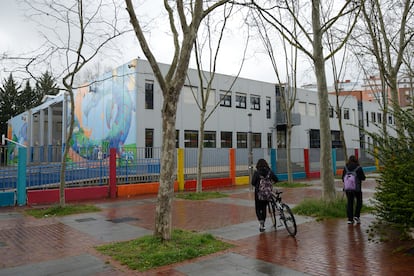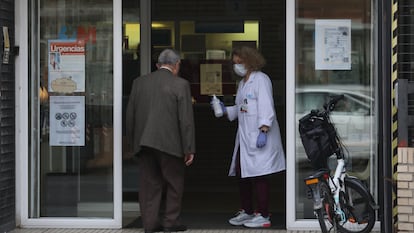Ten million students told to stay home in Spain in bid to slow spread of coronavirus
Madrid mayor is considering closing bars and restaurants as cases in the region reach 2,000

Around 10 million students across Spain will stay home for at least two weeks in a bid to contain the spread of the new coronavirus. The measure affects children in kindergartens, early, primary and secondary education, as well as university students.
Regional governments, which have powers over education, made the decision after Prime Minister Pedro Sánchez recommended it in a news conference on Thursday following a special Cabinet meeting to address the growing health and economic emergency in Spain.
Madrid and La Rioja, two high-transmission areas, were early adopters of school closures. They have since been followed by Catalonia, Galicia, Basque Country and the Canary Islands, which are shutting down schools on Friday, and by Murcia, Navarre, the Balearic Islands, the Valencia region, Cantabria, Andalusia and Castilla-La Mancha, which will enforce the closure on Monday.
Spain is one of the countries that’s been hardest hit by the SARS-CoV-2 coronavirus, with 3,142 infections (of these, 189 patients have been discharged after being declared officially cured) and 84 deaths by the latest count on Friday morning.
On Friday, Madrid Mayor José Luis Martínez-Almeida said he is considering the possibility of closing bars and restaurants to limit the spread of the disease as the regional healthcare system struggles to cope with the spike in new cases. Sidewalk cafés have already been closed on municipal orders.
Meanwhile, Madrid officials this week sought to allay concerns that the entire region might be placed on lockdown, following the example of Italy.
“I want to say that Madrid will not be shut down, at least not on orders from the regional government,” said the regional premier, Isabel Díaz Ayuso, of the conservative Popular Party (PP), in statements on Wednesday. “And the central government has not relayed any decision that might be interpreted as the closure of Madrid.”
The main issue is for people to understand why we are doing thisAngel Rodríguez, epidemiologist
Madrid is at the center of the outbreak in Spain, with nearly 2,000 infections and 40 deaths by Friday morning. On Thursday morning, it emerged that Equality Minister Irene Montero had tested positive for the coronavirus. Her partner, Unidas Podemos leader and Deputy Prime Minister Pablo Iglesias, was quarantined at home. Several other high-profile politicians have tested positive in recent days.
At around 1.30pm on Thursday, news emerged that Spain’s lower and upper houses of parliament, the Congress of Deputies and the Senate, would be suspending their activity for two weeks, Javier Casqueiro reports.
Also on Thursday, Madrid Mayor José Luis Martínez-Almeida called on citizens in the Spanish capital not to leave their homes unless it is strictly necessary. Madrid authorities have instructed the municipal funeral service that wakes should not be held at funeral homes for victims of the Covid-19 disease, or other respiratory illnesses.

The Madrid health authority on Thursday canceled all leave for health workers in the region, and has authorized flexible work schedules in hospitals and clinics in a bid to respond to the requirements of the crisis.
Spain’s top-flight soccer league, La Liga, announced on Thursday that it was going to suspend two game days that would have seen matches played behind closed doors. Real Madrid has placed its entire soccer and basketball teams in quarantine, after a basketball player tested positive for the virus. The team had played a game behind closed doors in Milan nine days ago.
Madrid’s famous Rastro flea market will also close this weekend to avoid contagion, as will other street markets in the city. This measure will also be in place for 15 days.
All options open
Although Spain has so far avoided far-reaching measures such as those seen in Italy, which has tightened its lockdown and forced most businesses to close, central government sources said that in theory all options remain open, including a partial and gradual closure of the Madrid region.
A partial closure was effected at the border between Morocco and the Spanish exclave city of Melilla in North Africa on Thursday, when access was denied to the hundreds of porters who carry goods across every day, in a bid to prevent large gatherings of people. Moroccan authorities are also doing temperature checks on everyone coming in through Spain’s other exclave city, Ceuta.

The Spanish Cabinet was due to hold an extraordinary meeting on Thursday to approve financial aid to address the impact of the coronavirus, which was declared a global pandemic by the World Health Organization (WHO) on Wednesday.
Prime Minister Pedro Sánchez also had a Thursday appointment with the heads of Spain’s two main labor unions, CCOO and UGT, and with the presidents of employer associations, to discuss these measures. The decision to close Madrid’s schools for 15 days has already led to suspended job contracts for people who work at school cafeterias and in special education, among others. Unions say that many companies have already drafted temporary collective dismissal plans.
The deputy premier of the Valencia region, Mònica Oltra, suggested on Thursday cancelling the high-speed rail service from Madrid to other parts of the country, after underscoring the sacrifice that her region has made by postponing the world-famous Fallas fiestas. Meanwhile, the closure of Madrid universities and student residences is pushing many students from other parts of the country to buy tickets back home, fueling fears that they may increase the spread of the SARS-CoV-2 coronavirus.
Plans in Madrid
“We are following instructions from health authorities and if it is necessary to take new measures, we will move into action,” said one source familiar with the Madrid contingency plans. “Nothing leads us to believe that this is going to happen imminently, and we need to stay calm because we are perfectly prepared.”
The new measures, should they become necessary, could affect the Adolfo Suárez-Madrid Barajas airport, the railroad service and the roads. Limits on public transit systems like buses and the Metro train line would first be introduced. A second phase could involve shutting down restaurants and entertainment areas. Later would come closures of all businesses save those selling food. And finally, there could be movement restrictions in specific areas of Madrid with a high concentration of positive cases.
For now, Madrid has cancelled classes for 15 days, closed over 200 senior homes as well as museums, and banned indoor events attracting over 1,000 people.
A Valencia official suggested cancelling high-speed rail service from Madrid
“The main issue is for people to understand why we are doing this,” said Ángel Rodríguez, a family doctor and epidemiologist. “What we’re trying to avoid is an accumulation of cases at the beginning, all at once, because that would overwhelm the [healthcare] system, and that is our most precious asset.”
“In this country we have a tendency to wait for orders, we depend a lot on the authority and a lot of people think that as long as there are no orders, nothing must be done. But there is a civic duty to act early and avoid contagion.”
English version by Susana Urra and Simon Hunter.
Tu suscripción se está usando en otro dispositivo
¿Quieres añadir otro usuario a tu suscripción?
Si continúas leyendo en este dispositivo, no se podrá leer en el otro.
FlechaTu suscripción se está usando en otro dispositivo y solo puedes acceder a EL PAÍS desde un dispositivo a la vez.
Si quieres compartir tu cuenta, cambia tu suscripción a la modalidad Premium, así podrás añadir otro usuario. Cada uno accederá con su propia cuenta de email, lo que os permitirá personalizar vuestra experiencia en EL PAÍS.
¿Tienes una suscripción de empresa? Accede aquí para contratar más cuentas.
En el caso de no saber quién está usando tu cuenta, te recomendamos cambiar tu contraseña aquí.
Si decides continuar compartiendo tu cuenta, este mensaje se mostrará en tu dispositivo y en el de la otra persona que está usando tu cuenta de forma indefinida, afectando a tu experiencia de lectura. Puedes consultar aquí los términos y condiciones de la suscripción digital.








































